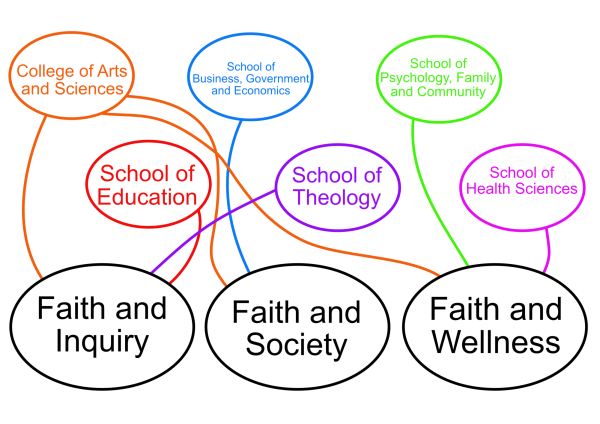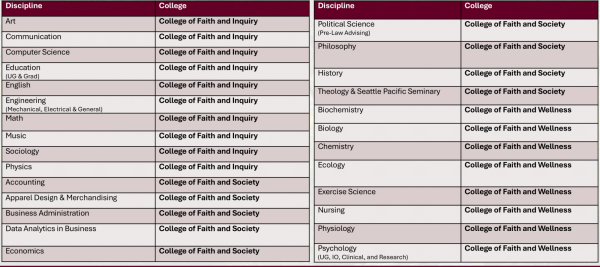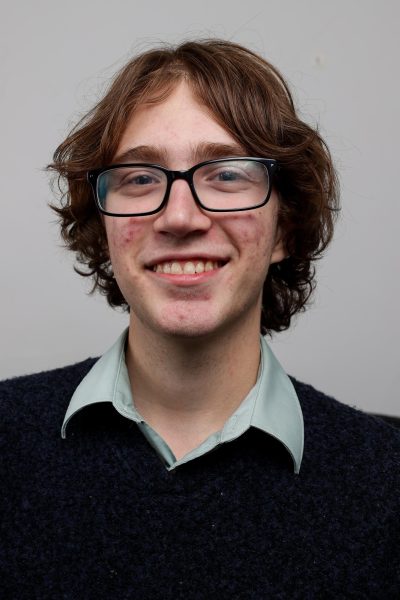
Seattle Pacific University deans and administration spent much of autumn quarter negotiating a plan to downsize from six colleges to three colleges (a change from the former “schools”). The three new schools are as follows: Faith and Society, Faith and Wellness, and Faith and Inquiry. All remaining programs will fit into one of the three colleges, and SPU is forming a “Change Management Team” to solidify the details and take in faculty input.
Specific details about how each program would fit into each college were not detailed until a meeting on Wednesday, Jan 15 in which Chief Academic Officer Kathy Lustyk, accompanied by the proposed deans of the new colleges, revealed the plans for reorganization. Lustyk detailed the current plans for which programs will move to which colleges. The plans will be solidified and “soft launched” via the SPU website in July, and the plans will be “hard launched” in September. In the meantime, the Academic Leadership Cabinet will become the Change Management Team on a bi-weekly basis. The team will work to solidify the university’s restructuring in their meetings, and will take input from faculty.

While the decision to reduce from six colleges to three will not be overturned, specifics on what programs will go into each school will be decided in the meetings. The names of these colleges lead to many questions from faculty concerned that adding “Faith and” before the name of the colleges may impact the enrollment of non-religious students.
“We note in the research that the students we want to recruit care about the names of our programs, less so about college names,” Lustyk said.
Lustyk also explained how the new college names will work to portray SPU as a Christian university.
“What we want to be known for is deep faith integration that is not afraid to be involved in the complex problems of our world,” Lustyk said. “That is something that we want to highlight as a distinction for SPU. We want people to know that Christian faith is not at odds with serious academic studies, but it propels us to be the best in our field and best serve the world.”
Expanding on this idea, Lustyk explained that new names were primarily for marketing towards donors.
“That’s a marketing tool. It’s great for fundraising,” she said.
How the university will market their increased public commitment to Christianity to donors while still insisting that new students will not notice the names was not made clear, even after multiple faculty members inquired as to how such a marketing plan would function.
Some faculty raised concerns during the meeting that the new college names may not look professional on stationary used for writing letters of recommendation, Lustyk offered an answer that left many in attendance looking confused.
“I did bring that up at Council, and I’m going to retract that,” Lustyk said. “I don’t think we need to do anywhere as much change on business cards [and stationary].”
After faculty inquired as to how far the branding change would go, Lustyk responded by referring them to go to the future Change Management Team meetings.
“I encourage you to have that conversation.” Lustyk said.
The deans of the new colleges will be repurposed from the former colleges. Current dean of Theology, Brian Lugioyo, will become the dean of Faith & Society. Current dean of psychology, Katy Tangenber will become the dean of Faith & Wellness. Current dean of education, Nyaradzo Mvududu, will become dean of Faith & Inquiry.
At various points, faculty inquired as to the new responsibilities of the deans. Their questions were mostly left unanswered until Professor and Co-Chair of Biology Cara Wall-Scheffler, who was the most vocal faculty member of the meeting, made the question rather clear.
“It would be helpful to know what your job descriptions actually are now,” Wall-Scheffler said. “What are you in charge of? I’m gathering that your deanship is not the same as the deans in your position right now. So, what are you doing? Are you still in charge of budget? Are you still in charge of curriculum? Are you still in charge of writing assessments? Do you still care about the professional development of your faculty in addition to the new job you have because we’re going to be 117 faculty which literally broke my heart a little bit. Do you know in this role what your description is? In reality, your job description really matters.”
Tangenber responded to Wall-Scheffler, explaining that the new dean positions will oversee executive budget and donor relations, and that the jobs of the deans will likely be dependent on the colleges, but also explained that their responsibilities have not yet been solidified.
“In terms of the job description, I don’t think we have one,” Tangenberg said.
Throughout the meeting it was made clear that while the larger administrative decisions have been made, the fine details are still variable and that the administration is relying on faculty input to shape the future of the internal operations for the university.
“Welcome to the process,” Lustyk said. “Now it’s time for us to come together. Really, your voice is important.”





















































































David Diekema • Feb 25, 2025 at 1:48 pm
This is the most ridiculous academic organization I have ever seen. SPU fast on the way to becoming a bottom tier university.